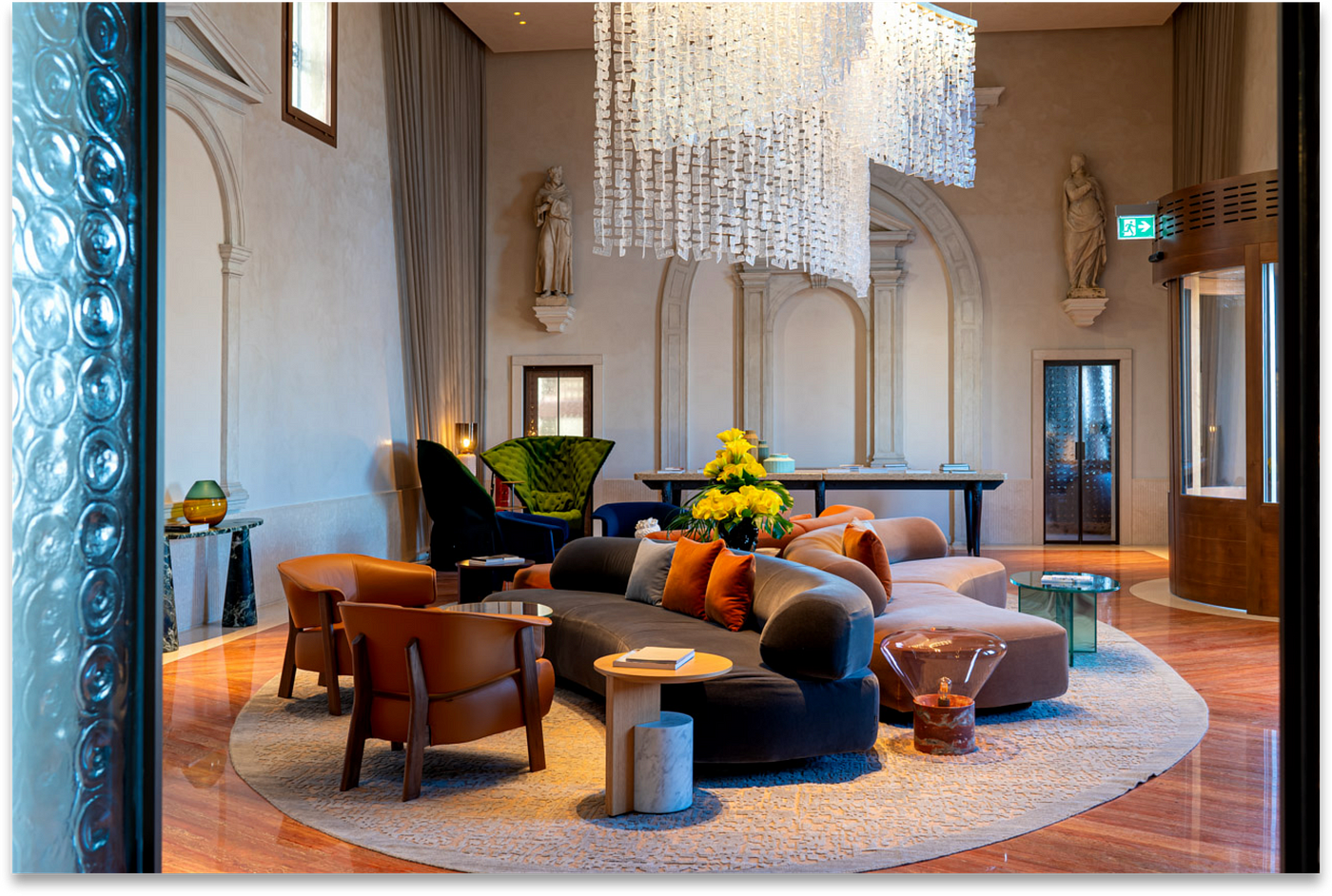NFTs—Your new key to the hippest hotels, restaurants, and clubs
—NFTs help the fashionable hoteliers and restauranteurs attract (and track) the Gens Y & Z crowd and keep them coming back for more.

NFTs meet the booming hospitality world
The hospitality business is booming. Global travel and tourism levels are projected to reach up to 95 percent of pre-pandemic levels in 2023, contributing an estimated $6.5 trillion to the global economy representing 6 percent of the world's GDP. According to Crunchbase, the hospitality tech space now represents almost a $93 billion business, with 5,610 active VC-backed companies. Since 2018, the VCs have pumped nearly $7 billion into over 1,200 hospitality tech startups. Only fintech and healthcare have more startups in their sectors.
On a positive note, the pandemic accelerated the move of tech adoption. Historically, the hospitality industry has been below average in adopting new technologies but is now one of the fastest-growing sectors integrating and offering new Web3 technologies. Offering NFT Membership cards has helped personalize guests' experience, makes people feel part of an exclusive community, and is a key to privileges and access to dining rooms and gyms. Blockchain-based back-end applications also help automate, validate, and manage customer history and data and reduce operational costs.
Implementing NFT marketing strategies provides hospitality companies a competitive opportunity to attract the highly sought-after international and crypto-friendly Gen Z and Millenial travelers and keep their brands on the cutting edge.
What is a non-fungible token (NFT)?
An NFT is a unique digital identifier recorded on a public blockchain as a certificate of authenticity and proof of ownership of a variety of digital files, such as artwork, photos, videos, audio, and in-game virtual goods. The NFT format also makes it easy for the owner to transfer, trade, and sell their assets. NFTs cannot be copied, substituted, or subdivided. Because NFTs are uniquely identifiable, they differ from cryptocurrencies, such as Bitcoin, which are fungible. Anybody can create NFTs as it requires few or no coding skills. NFTs first kicked off in the art and collectible business as digital trading cards.
NFTs and luxury hotels and restaurants
A good insight into how blockchain might impact hospitality is in the 160 billion global luxury hotels and restaurant industry. Some of the world's hippest brands have joined the NFT fad. Here are a few.
Dream Hollywood Hotel, Hollywood, CA
A sought-after destination in Los Angeles, California, the Dream Hollywood Hotel is the leading adopter of NFT technology for travel marketing. The hotel joined forces with The Crypt Gallery to host an NFT exhibition in its lobby. The exhibition showcases NFT digital art pieces in a traditional gallery setting, offering a unique visual experience.

The hotel also launched a VIP membership called the Social Club, purchasable through a limited edition NFT collection. Benefits include exclusive events and access to pools, cabanas, saunas, a lounge, a gym, co-working spaces, concierge services, and metaverse events. In addition to other benefits, holders are allowed a +1 throughout their experience.

Flyfish Club, New York City
Founded by Gary Vaynerchuck from the US hospitality company VCR Group, Flyfish Club (FFC) is a New York-based restaurant and among the first to start using NFT technology. The restaurant builds patron loyalty by issuing NFT-based membership cards that can only be purchased with approved cryptocurrencies. People interested can choose between two types of memberships: Flyfish and Flyfish Omakase. The former includes access to a beautiful 10,000 square feet cocktail lounge, outdoor space, and upscale seafood restaurant: the cocktail lounge and private events.
The essential membership cost is 2.5 Ether — about $8700. The Flyfish Omakase gives members access to the Omasake room — an exclusive and private dining room. This premium membership is available for 4.25 Ether or about $14,942. To claim exclusive access to FFC, NFT holders must create a member profile at the FFC official site and verify the ownership of their tokens by connecting their wallets.


Ca’ Di Dio Hotel, Venice, Italy
The luxurious Ca’ Di Dio Hotel in Venice made headlines with its innovative use of NFTs. The hotel utilized the OpenSea NFT marketplace to auction off a promotional NFT that granted the winner a once-in-a-lifetime opportunity to experience a night in the hotel entirely alone before its official grand opening to the public.

At Ca’ Di Dio, your NFT offers privileges such as access to the most prestigious room and dinner on the roof terrace, with a view of the lagoon and San Giorgio. And a private boat transfer guests to the hotel. The hotel auctioned the NFT and sold it for 1 ETH, roughly equivalent to $3.280.

New York’s NoMo SoHo Hotel
The NoMo SoHo is a 26-story, 264-room downtown Manhattan property in New York City. NoMo SoHo’s owner, the global real estate and investment firm Sapir, recently sold a condominium in its luxury oceanfront boutique property in Surfside, Miami, for $22.5 million using cryptocurrency. That success spurred the idea to allow hotel guests to book stays at the NYC location using the digital marketplace platform SolidBlock.
The NFT stays package includes NFTs collectibles depicting “a recognizable part of the hotel, from The Lovewall in NoMo Kitchen restaurant to The Tunnel of Love iconic archway, access to preferred rates, late check-out, complimentary breakfast, and a welcome amenity. The NFTs must be redeemed within 12 months of purchase, and blackout dates apply. Pricing for NFTstays starts at .41 ETH, which, at launch, was valued at $836. The current value is $673.

“Through our partnership with SolidBlock, we are modernizing our practices to accommodate tech-savvy audiences while laying the groundwork for the future of real estate. Since our most recent launch, we have sold 25 of our available NFTstays, and we expect this number to increase as the interest in the service continues to grow.’
—Sharon Raz, the CEO of Sapir Corp Ltd.

Casa de Campo Resort & Villas, Dominican Republic
The Casa de Campo property in the Dominican Republic recently announced a partnership with Pinktada, a membership-based hotel marketing and reservation platform that allows guests to reserve rooms with transferrable room night tokens (RNTs) using blockchain technology. Approached by Pinktada during the development stages of the new luxury property, Casa de Campo’s head of sales and marketing, Jason Krycek, said they quickly aligned with Pintada. “We observed an increase in our guests discussing the crypto, blockchain, and NFT industries, so we seized on the opportunity,” says Mr. Krycek.


A stay booked on Pinktada allows guests can access discounted room rates for the property’s Superior Casitas and Elite Rooms. Users can also view a 3D experience of the room and its amenities and virtually tour Casa de Campo’s restaurants, pools, golf courses, shooting ranges, and equestrian centers. Pinktada users also receive a custom, commemorative NFT of their stay.
Mr. Krycek explained that once a room is booked, it is commoditized and converted into an RNT (think of it like an NFT). Guests can then swap, trade, or sell back their RNT on the Pinktada exchange. “It’s a win-win for all parties, like a StubHub for hotels,’ he gushed.

Viceroy Los Cabos, San José Del Cabo, Mexico
Viceroy Los Cabos in San José Del Cabo, Mexico, is the first hotel in Latin America to Mint NFTs. In July, the luxury oceanfront resort debuted its Digital Art & Dinner Club in partnership with Leales NFT, a local crypto consultancy. The art and loyalty program supports the community of local artists while offering members access to hybrid events. To become a member, guests must purchase an NFT of artwork from featured creators, with three membership tiers — Charter, Gold, or VIP — available. Perks include discounts up to 25 percent, complimentary drinks and meals, and entrance into giveaways for stays of various durations.
“Statistics tell us that a growing segment of our guest population is very interested in the trend of NFTs and wants the luxury travel sector to offer blockchain and crypto-based opportunities,” explained Peter Bowling, managing director at Viceroy Los Cabos. During the kick-off party, the hotel issued and sold 15 memberships. A total of 3,210 memberships will be available for sale.

Marriott International
Marriott International became one of the first hospitality brands to incorporate NFT technology in their business strategy. The hotel partnered with digital artists TXREK, JVY, and Erick Nicolay to create unique digital images that owners would claim as their original artworks under the theme “The Power of Travel.” The resulting artwork was then showcased at the Art Basel Miami Beach event, where randomly picked guests won limited edition NFTs featuring the artist’s work and 200,000 Marriott Bonvoy points. Winners can also use their NFTs to explore pathways to almost 8,000 properties in the Marriott Bonvoy Portfolio.

Wyndham Hotels & Resorts
Wyndham teamed up with crypto payments and trading start-up crypto payments company Bakkt and created a Bitcoin rewards program, where guests staying at any Wyndham hotel can now claim Bitcoin rewards, which can be converted into cash or other loyalty perks.
Travala
Travala is the world’s top blockchain-based travel booking platform, with thousands of clients worldwide. Their online travel platform offers over 2.2 million properties in over 90,000 destinations throughout 230 countries. Given its experience using blockchain, it was natural for Travala to create an NFT-based travel rewards program allowing users to access their Smart Diamond membership tier, giving them benefits beyond a simple booking. The Smart Program offers many rewards, including Smart Discounts, Proof of Travel, Travel DRops, Exclusive Access, Concierge Access, and many others.
Travala’s “Travel Tigers” NFTs are a collection of 1,000 unique, randomly generated utility NFTs living on the Ethereum blockchain, enabling all members to purchase a unique NFT. The NFTs acted as keys allowing members to unlock Smart Diamond rewards, including points, bonuses, and discounts. Every Traveling Tiger featured in the NFT collection is a nomadic traveler with unique characteristics. These NFTs work in combination with AVA which is a multi-chain token. It is based on the Binance Smart Chain (BEP-20), Binance Chain (BEP-2), and Ethereum blockchain (ERC-20). Once a traveler becomes a Travala’s Smart Diamond club member, they can receive giveback rewards paid in AVA. To unlock the Smart Diamond status, travelers need a Travel Tiger NFT and 2,500 AVA.
Freehold Hospitality
Brice Jones, the co-founder and CEO of Freehold Hospitality, which recently began accepting crypto as payment at its 10,000-square-foot Miami location and hosting tech-friendly happy hours, said he believes the crypto space has been “an underserved area in hospitality.”
“I think the NFT market, when coming to hospitality, will need to focus on real functional value,” he said. “The NFT itself can be beautifully designed and art- or trend-driven, but the essence will have to have material value for consumers — whether it be access to a VIP section at a nightclub, a room block that is only open to those NFT holders, or maybe access to a concert. We’re already seeing some major boutique hoteliers offer similar concepts, so we’re excited to see what’s next.”
Summary of NFT benefits hoteliers and restaurateurs
The above examples are just some early use cases for NFTs in the hospitality industry. From creating unique and collectible experiences for guests to improving customer loyalty programs and digitizing reward systems, NFTs have the potential to revolutionize the way hotels and hospitality brands interact with and retain their customers.
Following is a summary of the primary benefits of adopting NFT strategies in the hospitality space.
Building brand loyalty around reward program benefits:
Personalization and authentication: Guests receive a custom NFT that includes their name and room number and is their authentication key to their rooms.
Exclusive access: NFTs can access privileges such as premium dining reservations, the gym, swimming pool, VIP lounge, or other exclusive areas of the hotel.
Special offers and rewards: NFTs can accumulate rewards and discounts on future reservations and other benefits.
Social media sharing: Customers can display them on social networks like Instagram, TikTok, and Facebook.
Ownership and transferability — The guest owns the NFT and can share, trade, gift, or sell their NFT on secondary markets.
Monetization: NFTs provide hospitality brands with a new revenue stream, as they can sell digital assets directly to their customers to access more privileges.
Managing and tracking customers:
Easing Operations: Using tokenization-as-a-service, hotels can automate data management and operations on the blockchain and eliminate tedious work and employee workloads.
Reservation management: Allows guests to use NFTs to reserve premium tables and eliminate the need for constant coordination.
Tracking customer engagement: NFTs can more closely track, record, analyze, and store customers’ experiences with their brand automatically on a blockchain in a data-safe format.
Low cost — NFTs are digital assets that are relatively easy and cheap to produce.
Marketing tactics:
Partnering with artists and influencers: NFTs can drive brand awareness and create a buzz around a hotel or restaurant by partnering with local artists and musicians to launch a limited-edition NFT collectible series of photographs, 3D art, videos, animations, music, and digital sketches.
Attract new crypto-savvy customers: NFTs appeal to the growing base of international travelers, especially Gen Z & Millenials, who are early adopters, for several reasons.
Repeat business is what makes the top hospitality providers win. NFTs will play an essential role in helping hospitality brands build long-lasting relationships with their clients and keep them top of mind.








